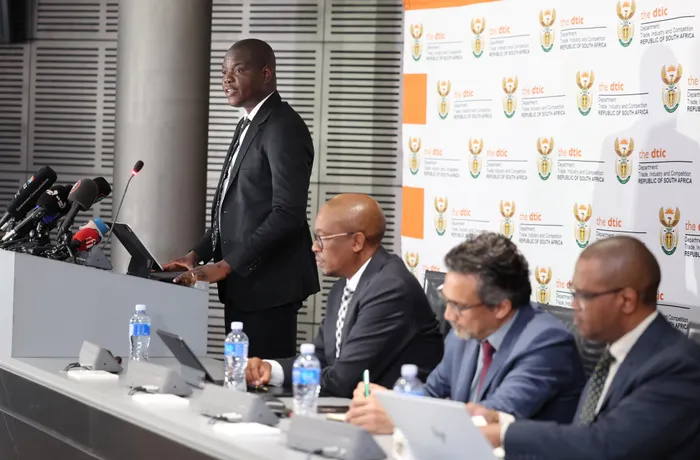Trade agreements: Parks Tau, Lamola accuse Trump administration of negotiating in bad faith

Minister Ronald Lamola says the SA government is still engaging with the US about the tariffs that are set to come into effect for the country later this month.
Image: GCIS
Despite guaranteed job losses and negative impact on trade volumes, the impending 30 percent tariffs imposed by Donald Trump's administration will not result in the total collapse of the country's economy.
This is the view of economic expert Johann Els, following a joint media briefing by ministers of trade and industry, Parks Tau and his international relations counterpart, Ronald Lamola, on Monday.
Both Tau and Lamola accused Trump’s administration of negotiating in bad faith by failing to honour an agreement to sign a confidentiality agreement that had been agreed upon following a joint media briefing held at the Germiston Cici Centre, where members of the ANC NEC are gathered for a range of issues of national and international interest.
As a result, South Africa is now looking to expand its trade relations with Asia and the Middle East, whilst continuing to engage with Trump's administration over the hikes set for later this week.
“We waited for the US to sign the confidentiality agreement after we had signed our agreement. We got to a point where there was an agreement to unlock the discussions. However, we did not get a signed confidentiality agreement from the US. We then went back almost on the eve of the tariffs and said we have been waiting for the confidentiality agreement, what do we do now, as we have two days, and the feedback was that at this point, let us look at the template as a response,” he stated.
Addressing the media, Lamola echoed Tau’s sentiments, saying South Africa had done all it could to ensure that the negotiations with Trump’s administration bear fruit, adding that despite all these efforts, Trump decided to continue with the 30 percent retaliatory tariffs against some of the country’s key export industries, which include motor and the agricultural sectors.
"Since the beginning of the 7th Administration, South Africa has embarked on a process to stabilise and enhance mutually beneficial trade and investment relations with the US. The aim has been to address long-standing bilateral issues of concern for both sides in ways that move the trade relations forward... However, even with these efforts, the US decided to impose a 30 percent unilateral tariff on South Africa."
Lamola said government's efforts in resetting the relationship with the US have been undermined by some actors within South African society.
"The unilateral tariffs have been implemented notwithstanding South Africa’s submission of a comprehensive and ambitious Framework Deal in May 2025 aimed at addressing the US trade deficit, addressing tariffs, promoting digital trade, and eliminating non-tariff barriers to enhance mutually beneficial trade relations with the United States," he said.
Reacting to the impending tariff hikes, Els stated:" US tariffs on SA exports will impact the SA economy. There will be a loss of volume because of the higher pricing. There will be some employment losses. But it is also important to see the bigger picture as the tariffs will impact less than 5% of the country's total exports, as some industries are not affected, and they will not collapse to zero overnight."
On Monday, via his weekly newsletter, President Cyril Ramaphosa stated that the decision by the United States to impose a 30% tariff on South African imports highlights the urgency with which the country has to adapt to increasingly turbulent headwinds in international trade.
"The US is South Africa’s second largest trading partner by country and these measures will have a considerable impact on industries that rely heavily on exports to that country and on the workers they employ, as well as on our fiscus. Domestic sectors such as agriculture, automotive, and textiles have historically benefited from duty-free access to the US market under the African Growth and Opportunity Act (AGOA). Our trade relations have historically been complementary. South African exports do not compete with US producers and do not pose a threat to US industry," Ramaphosa said.
siyabonga.sithole@inl.co.za